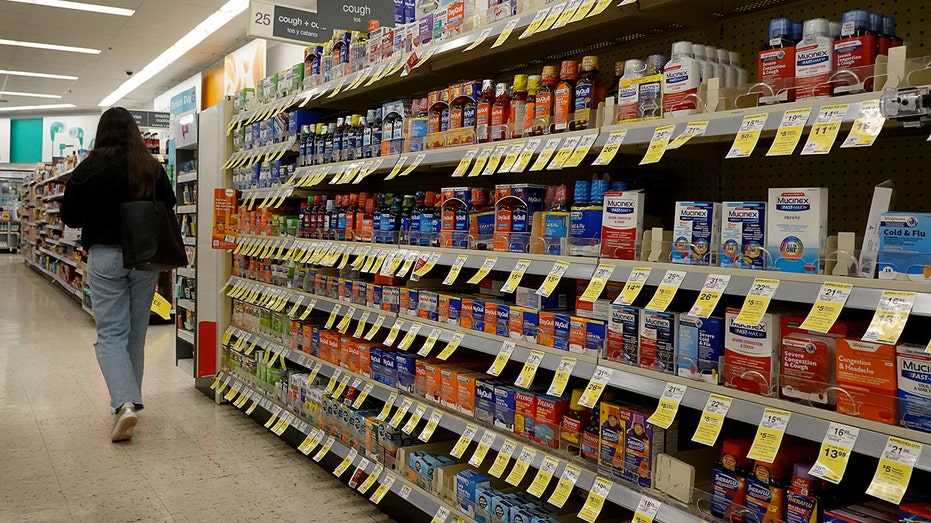What is phenylephrine and why is CVS pulling products containing it?
The FDA advisory panel's recommendation only applies to oral phenylephrine
Consumers might not recognize the drug phenylephrine, which has been making headlines in recent weeks. However, it's been used for temporary relief of nasal congestion since being approved by federal health regulators in 1976.
Ever since gaining approval from the U.S. Food and Drug Administration (FDA) for over-the-counter use, it's been an ingredient in scores of popular cough and cold products, including Benadryl Allergy Plus Congestion, Sudafed PE Sinus Congestion and Vick's DayQuil.
By 2006, it became the main ingredient in many over-the-counter medicines, replacing pseudoephedrine, which was moved behind counters because it could be processed into methamphetamine.
CVS PULLS POPULAR COLD MEDICINES FROM STORE SHELVES

Cold and flu medicine sits on a store shelf in Miami on Sept. 12, 2023. (Joe Raedle/Getty Images / Getty Images)
Here's what you need to know about the FDA panel's recommendations and what it means about the drug:
Last month, all 16 members of the FDA's Nonprescription Drugs Advisory Committee (NDAC) agreed phenylephrine, when taken in the form of a pill or liquid, isn't effective in offering relief from nasal congestion. The drug comes in pill form, liquid or nasal sprays.
"The issue is that there is no evidence that phenylephrine's purported action works any better than a placebo," Dr. Robert Glatter, a New York City-based emergency room physician, told FOX Business, citing a single randomized placebo-controlled study published in 2009.
This lack of evidence of benefit prompted the FDA to reconsider the effectiveness of the drug, Glatter explained.
The committee provides independent recommendations to the FDA, but the agency makes the final decision. Even though the FDA hasn't done so yet, CVS has voluntarily pulled products containing phenylephrine as an active ingredient from shelves, becoming the first major pharmacy to do so.
Dr. Dipak Chandy, section chief of critical care and pulmonary at New York's Westchester Medical Center, told FOX Business this doesn't mean the drug isn't safe at the current recommended dosage.
Patients "don't have to be worried about something bad happening," he said. "This is purely an ineffectiveness issue, and it's not really a safety issue."
FDA ADVISORY PANEL SAYS WIDELY USED DECONGESTANT CONSIDERED INEFFECTIVE
He also reiterated that the panel's recommendations only pertain to the drug when it is taken orally. It's still effective in nasal sprays.
Typically, people become congested after blood vessels in the nasal cavity become irritated and get swollen, according to Chandy.
"It's doing nothing and it's doing no harm. It's doing no good. … It's really a completely pointless drug that's mixed in with a bunch of other medications."
Previously, it was thought that oral phenylephrine would help to reduce this swelling and improve a patient's symptoms. The problem is that when the medication enters into our stomach and gastrointestinal tract, the "drug essentially gets inactivated to a very significant extent," he explained.
With the doses that are being sold over the counter, the "belief is that almost nothing actually enters your bloodstream and what actually gets to the nose is almost nil," Chandy added.

Cold and flu medicine sits on a store shelf in Miami on Sept. 12, 2023. (Joe Raedle/Getty Images / Getty Images)
With nasal sprays, the drug is "going directly on the blood vessels in the nostril and then can therefore constrict those blood vessels and be effective," he said.
GET FOX BUSINESS ON THE GO BY CLICKING HERE
You can still take the drugs that have phenylephrine to treat other symptoms.
In its September notice, the FDA reminded consumers that while some products only contain phenylephrine, there are other products that contain phenylephrine and another active ingredients such as acetaminophen or ibuprofen, which are still effective at treating other symptoms like headaches or muscle aches.
Chandy explained that the presence of phenylephrine won't affect how those other active ingredients work.
"Think of it almost like a useless drug that's sitting in there," Chandy said. "It's doing nothing, and it's doing no harm. It's doing no good. … It's really a completely pointless drug that's mixed in with a bunch of other medications."
Other ways to reduce congestion
There are other ways to clear up congestion. Glatter noted that consumers can still use nasal saline sprays, nasal irrigation, warm compresses and humidified eucalyptus to provide relief for nasal congestion.






















